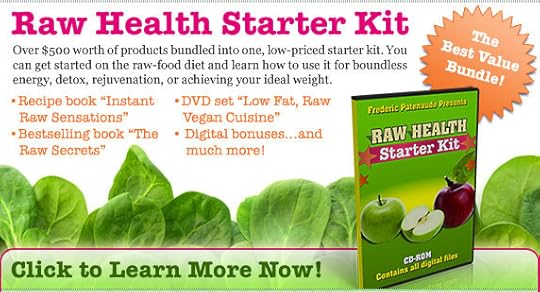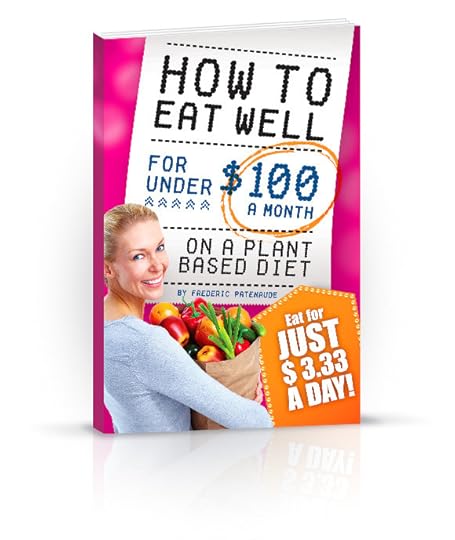Frederic Patenaude's Blog, page 39
November 29, 2012
12 Reasons Why I Don’t Eat 100% Raw
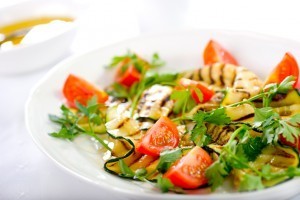 Because I’ve been involved in the raw food movement since 1997, some people assume that I’ve always eaten a 100% raw food diet. This is not the case.
Because I’ve been involved in the raw food movement since 1997, some people assume that I’ve always eaten a 100% raw food diet. This is not the case.
I only ate a 100% raw food diet for about 3 and 1/2 years in my early days, and since then, after a lot of experimenting, I eat a combination of raw and cooked foods. Of course, during the last 15 years, I’ve had periods when I ate more or less raw foods. I also ate 100% raw for months at a time.
But It’s been very clear for many years that a 100% raw food diet as an ideal to maintain for life was not the right diet for me.
So in today’s article, I’m going to explain the reasons why. This is the first part of the article, with the last part coming next week.
But first, a little update. For the past year, I’ve been working on a new book.
This is a book that I’m actually VERY excited about.
If you read my book “Raw Food Controversies” you read towards the end of the book how I was planning to release a program called “The Mostly Raw Plan.”
This project kept evolving and I decided it was going to be a book. However, the name has been change and so far the name I’ve kept is “Beyond Raw.”
Not the most original, but I do think it describes better what the book is about.
Essentially, this is a book I’ve been wanting to write for about 8 years. I’ve worked on it on and off, but never found the right angle. Now, it’s all coming together and I’m really excited about it.
The purpose of “Beyond Raw” is to present an alternative to the rigid, inflexible raw food diet presented by most raw food “gurus.” Their diet may have appeal to some people, but it does not work and is not practical for 99% of people.
Guilt, lack of fresh ripe foods, confusion about contradicting health messages and social isolation make the 100% raw food diet very difficult to follow.
But you can feel great, strong and healthy by incorporating specific cooked foods into your diet? If you’re struggling to find balance, are plagued by the food guilt, then this new book will be for you.
This new book will be quite a breath of fresh air and hopefully will help a lot of people. I’m working on it relentlessly, and it should come out in February.
I would love to hear your comments on this topic below! And any other suggestions you might have about the book…
12 Reasons Why I Don’t Eat 100% Raw (Part 1)
#1 Cooked food is not toxic
One of the main reasons why I don’t eat a 100% raw food diet is that… there’s really nothing that has really convinced me that this is a requirement for health. A lot of the raw food “advice” spread everywhere in books and websites often implies that eating cooked foods will make you sick, because it is “toxic.”
Pseudo-scientific arguments have included:
- The food enzyme theory
- The Pottenger cat study
- The digestive leucocytosis study
- Kirlian photography
- The “diet by design” arguments
- The “no other animals cook their food” argument
In this article I will not debunk each of these myths. You can already find a lot of information on the subject on my website on many of these myths, and future articles, as well as my upcoming book, will thoroughly destroy these false beliefs.
My conclusion is that cooking food does not make it “toxic” by any stretch of the imagination. Some cooked foods are unhealthy, some cooking methods are relatively bad as well, but so are some raw foods or raw food combinations.
It’s not whether a food is “raw” or “cook” that matters. This is really an oversimplification. We have to look at many more factors to judge whether a food is healthy or what could be its part in a healthy diet.
Raw foods have benefits — of course — and HUGE ones. Don’t get me wrong, I’m a big proponent of raw foods. This is a lot of what this website and my products are about.
But cooking some foods also can be beneficial. It essentially increases the variety of foods you can consume and increases the overall quality of your diet. Many vegetables, for example, are difficult to eat raw, but extremely healthy after being just lightly cooked.
So my first reason not to eat a 100% raw is that I simply do not believe I would be healthier if I did a pure raw food diet.
#2 I enjoy traveling too much
One of my passions in life is traveling. And when I travel, I like to discover and enjoy other cultures. On a 100% raw food diet, traveling can be a big hassle. You’re essentially condemned to spend all your time looking for fruit markets and then eat your food in tupperware containers in your hotel rooms. Yikes!
I don’t travel all the time, but enough to want some flexibility when I travel to try some local cuisine, or be able to leave the hotel room for more than a couple of hours, without worrying about running out of food!
Maybe this reason wouldn’t apply to everybody, but for me enjoying some stress-free travel once in a while, without constantly obsessing about food, is one of the main reasons I don’t eat 100% raw.
#3 I like not freezing to death
I live in Canada. While I tend to spend a lot of time in the tropics every year, I do live in a cold climate most of the year. For example, this year, I’m not planning to leave the country this winter. And today, it’s already snowing outside.
I’ve done a 100% raw food diet in cold climates. And I’ve done a diet that includes warm, cooked soups and other cooked foods in the same climate. Which one is easier? I think asking the question is answering it!
Yes, 100% raw can be done in cold climates. But even the raw foodists that are doing it are often planning to move to a tropical country or state!
At this point in my life I have no interest in relocating to another country full-time. I like to visit other places, but not live there permanently.
In the heart of the winter, coming back home from a cold day only to turn on your blender and make a cold soup can be downright demoralizing. I’m only speaking for myself of course, but I see nothing wrong in enjoying a big pot of hot vegetable soup on cold days, instead of chewing a cold salad of raw lettuce and tomatoes.
#4 My digestion is strong enough
Many raw foodists tend to yo-yo back and forth between 100% raw and cooked food binges, only to return to more cleansing and detox and an even stricter raw food diet. They find that whenever they eat cooked food, it totally “destroys” them. A bowl of rice will make them pass out as if they ate a big Thanksgiving dinner, and eating out at the restaurant causes them to feel so sick that they’ll spend a week recovering from it.
I call it “the raw curse” and talked about this weird phenomenon in many of my books. This actually is going to be a big chapter in my upcoming book “Beyond Raw.”
Raw foodists incorrectly think that their bodies have become so pure (as in “super healthy”) that it now rejects the toxic cooked foods that most people are habituated to (like a drug).
In reality, what’s really going on is that the “raw food” body has simply stopped producing the right mix of digestive enzymes, that they simply can’t properly digest more complex foods now. By eating only foods that require almost no digestion (like fruit and greens), their digestion has “dumbed down” to the point it can’t handle anything much more complex.
Some people even take this to an extreme, making their diets even stricter with time, eliminating fatty foods like nuts and seeds entirely, for example. This leads them to become even more sensitive.
The same phenomenon happens in reverse. Someone eating a junk food diet devoid of fiber with lots of meat, white bread and few vegetables can experience some serious digestive discomfort when they start eating lots of fiber-rich foods, like beans or fruits and vegetables. In can take them weeks or months to adapt to this new healthy diet.
Some long-term raw foodists have even fantasized that if they ate a hamburger they would end up in the hospital, and possibly die. That’s a little extreme and probably not likely to happen, but there’s a good change that hamburger would make them seriously ill.
The trick to avoid the “raw curse” is to retrain your body to digest certain foods. You can do it for almost anything. And eventually, eating a bowl of brown rice won’t put you in a coma, and having a little bit of garlic in your stir-fry won’t cause you to have nightmares all night!
#5 – My teeth are better now
Don’t get me wrong: I eat a lot of fruit. But because my diet is more varied now, and my nutrient intake higher, my teeth are much stronger than before. When I was 100% raw or close to it, my teeth would be weak, prone to cavities, and often sensitive. Now my teeth are not sensitive even when I eat a lot of acidic foods, and I never get cavities.
One change I’ve also made in the last few years is that I now rarely eat a lot of citrus or very acidic foods. I focus on fruits that are milder, like bananas, apples, mangoes, papayas, and melons.
However, whenever I eat acidic foods, my teeth are fine because they’ve re-enamelized and built some resistance. Also, because my diet is more varied than someone eating 100% raw, I can get my carbs from a variety of sources, and therefore rarely have to resort to eating large quantities of acidic fruits.
#6 – I enjoy having a life
You can have a life if you’re 100% raw. But it will be a life that revolves around food. You will think about food, plan your food intake, and worry about food a lot of the time. And very likely, you’ll have to avoid many social situations around food, choose your friends carefully, always justify your diet, and surround yourself as much as possible with other food-obsessed raw foodists.
After having obsessed about food for all of my 20s, I enjoy having enough flexibility with my diet that I don’t have to constantly worry about social situations and how I will handle them with my “weird” diet.
I don’t go out of my way to eat junk food, and for the most part, I enjoy staying at home better than going out. However, the human being is a social creature. And I enjoy being part of the “world” without having to create a world of my own all the time.
So when family or friends invite me over, they’ll try to make something healthy for me. But I’m not going to analyze every single ingredient that goes in the food that I’m eating all the time. And if everybody is having wine, I’m going to have a glass too and enjoy it.
Your diet has to fit your personality, and make you happy. For some people, eating 100% raw fits their personality and maybe helps them control other aspects of their lives better.
My personality does not fit a 100% raw diet. I’m someone who’s passionate, always interested in new things, open-minded, and not an attention-seeker. I’m also very curious about the world, food in general, other cultures, and new ideas. To stick to a strict — no exceptions permitted diet — simply doesn’t work with who I am and never did.
I’m not saying that I’m 100% right — but I definitely know what’s right for me, and I also know that most people, no matter how hard they try, will not be able to stick to a 100% raw food diet, and that’s okay.
In my next article, I’ll explore six more reasons I don’t eat 100% raw.
Please leave your comments below, and let me know what you think of my new book project, Beyond Raw!
If you would like to find out about a program where you can eat for as little as $100 a month ($3.33 a day!) on a plant based diet, click on the ad below to read my new book “How to Eat Well for Under $100 a Month on a Plant Based Diet” and use coupon code FREDSBLOG to save $20 (expires on the weekend).
November 2, 2012
12 REASONS WHY RAW FOOD REALLY WORKS FOR WEIGHT LOSS
By Angela Valentine, www.RawFood-Weightloss-Guide.com
With the raw foods diet, weight loss is often more effective, as you are typically taking in lower calorie foods. So you can eat a lot more than you thought, and won’t go hungry (and thus you’ll likely stick with it longer, too).
Most raw foods – such as apples, cucumbers, celery, and leafy greens – are also typically higher water content foods, so you will become better hydrated. Improved hydration helps to flush out fats and toxins and helps all your organs function better.
By taking in improved and increased nourishment, you will become healthier all over. And when your body works better in every respect, its natural ability to burn off fat will be greatly improved. A healthier liver, especially, will improve your body’s fat burning ability.
It is hard to lose weight when your hormones are imbalanced. The plentiful nutrients contained in natural raw foods provide many of the precursors needed to produce those hormones. Plus, that nutrition will help to heal the organs which produce your hormones. Altogether, this helps you become more hormonally balanced so weight loss is easier.
With the raw foods diet, weight loss also occurs through detoxification. As your body naturally begins releasing the toxins often held in your fat cells, many of those fat cells will begin shrinking – and you will slim down.
You stop eating the toxin-filled, mucus-forming, hormone-imbalancing nutrient-poor dead, cooked, overly salted and processed foods that can cause weight gain and water retention in the first place.
The clean raw foods you do eat will not contain the chemicals and neurotoxins that can make you ravenously hungry (like restaurant foods do). Therefore, after a short time on a 100% raw foods diet, you find your physical sensation of hunger has changed. It becomes milder, subtler and much less insistent.
As you receive more and better nutrition, you become satisfied by less food. Your body doesn’t have to continue clamoring for more food to try to glean the tiny bit of nutrition that’s left in cooked food, if any.
As you become healthier, your metabolism works better, and you start to feel more energetic. Plus raw foods are easier to digest, which frees up tremendous amounts of energy. No more 3:00pm energy slump after a heavy cooked lunch.
As you have more energy, you are also more apt to begin or ramp up an exercise program, or become more active in your daily activities, which helps burn off more calories and fat.
After you’ve eaten the raw foods diet for weight loss even for a short while, you’ll notice that your emotions tend to even out. Therefore, you’ll have less need for emotional eating patterns that often lead to overeating or binge eating for comfort. You’ll feel happier, more balanced and more peaceful. Many even become more spiritually inclined.
When you become healthier than ever, you are no longer as “sick and tired” as you used to be, and it seems like your life improves in every way! You’ll discover that weight loss is only one of the many advantages of the raw foods diet!
To your success! ~Angela Valentine, www.RawFood-Weightloss-Guide.com
October 25, 2012
Six types of raw foodists. Which one are you?
I became involved in the raw food movement back in 1997. So it’s been about 15 years, and during that period I’ve met a LOT of people interested in this lifestyle.
I’ve sold hundreds of thousands of copies of my books and products, and many people have contacted me over the years to ask questions and share feedback.
I also have the chance to connect in person with many of these people in the few live events where I participate every year.
There are different types of raw foodists. Sometimes, people move from one type to another. Sometimes they give up completely.
So here are, based on my observations, the five different types of raw foodists. I’m not going to cover of course the variations in diet philosophy (such as 80-10-10 vs. Gabriel Cousens). But mostly the lifestyle. Which one are you?
Raw Food Wannabe
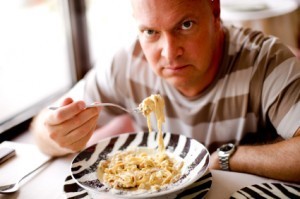 This type of person idealizes the raw food lifestyle. Maybe they did it at some point when they were younger. In any case, they are not currently doing it now, but they nonetheless lurk on discussion forums, buy the books, and think about doing it one day.
This type of person idealizes the raw food lifestyle. Maybe they did it at some point when they were younger. In any case, they are not currently doing it now, but they nonetheless lurk on discussion forums, buy the books, and think about doing it one day.
But due to the pressures of work, and family, their habits are too engrained to change at the moment, so their interest in the raw food diet remains at the intellectual level.
I’ve known many raw food wannabes, or health food wannabes for that reason. They’re the people with the giant collection of recipe books they never use, the juicer that’s gathering dust, and the pile of unused raw food products they ordered in the mail.
My advice to these people: You don’t have to go 100% raw to get the benefits of raw foods. Just change your breakfast to a green smoothie. Then have a large apple before every meal (15-30 minutes before, to be exact), and eat a big salad every day. You’ll get many of the benefits of raw foods without the stress that you’re not doing it perfectly.
The Yo-Yo Man
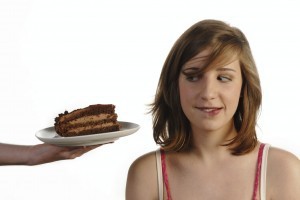 It’s not fun to be Yo-Yo Man, or Yo Yo Girl. These are the people that are really convinced that the raw food diet is the optimal diet. They have all the theory, all the books, and have actually put them in action. They have gone raw, but they can’t stick with it.
It’s not fun to be Yo-Yo Man, or Yo Yo Girl. These are the people that are really convinced that the raw food diet is the optimal diet. They have all the theory, all the books, and have actually put them in action. They have gone raw, but they can’t stick with it.
They’re the people counting in days the longest they’ve gone 100% raw, just like incorrigible smokers know exactly how long their last attempt at quitting started. You will meet them and they will complaint at how they can’t stick with it for more than three months at a time, but then something goes “wrong” and they “binge” on cooked food.
The worst thing about being yo-yo man is that you can’t help feeling extremely guilty every time you fall off the wagon. Even worst: you feel like you’re the type of person who can’t commit to his goals.
Yo-Yo Girl also gets sick. She feels great when she’s 100% raw, but when she falls off the wagon, her body is so “pure” that it reacts negatively with every cooked food she eats.
So Yo-Yo people truly get the worst of both worlds: they don’t feel they’re getting the results of raw, and yet at the same time they can’t enjoy eating cooked food because it makes them sick and guilty.
My advice to these people: Stop being a rubber ball. Bouncing back and forth between two diets and experiencing guilt and sickness every time is not a normal way to live. I know because I used to be a yo-yo man. I discovered that it was either better to stick to 100% raw, or to actually include some cooked food in my daily diet. I chose the latter option because I find it easier to have a normal routine. If you eat cooked food very infrequently (like once a month), your body never builds up the ability to digest it. That’s because fruits and vegetables require almost no digestion. Your digestion therefore weakens and that’s one reason why you react so negatively, whenever you go back and forth. So choose your way to live: there’s no shame in it. But going back and forth between two extremes (especially when one involves binging) is not a healthy way to live.
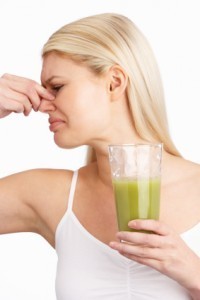 Detox Girl
Detox GirlDetox girl (or man!) is not a raw foodist. She’s someone who uses the raw food diet as a way to absolve himself from past sins, and sometimes as justification from a more hedonistic lifestyle the rest of the year.
Detox girl may eat a normal diet, with a stressful lifestyle most of the year, but a few times a year, she’ll find the time to do a raw food cleanse. She may actually go to a raw food retreat, like the Hippocrates Health Institute in Florida.
There’s nothing wrong with being Detox Girl, as long as your overall lifestyle is healthy. In fact, I recommend to incorporate some fasting or cleansing diets a few times a year as a healthy way to reset your health.
The trap for detox people is to use detox as an excuse to indulge even more the rest of the year.
The 80%-er
Raw foodists like to calculate the percentage of raw foods they eat, often based on very subjective methods. When people say they eat 80% raw, is that by weight, calories, or by meal?
In any case, this category of raw foodist is either 80% raw, 60% raw, or 90% raw, depending on how they choose to calculate it.
The point is that they’ve incorporated many raw food principles into their daily routine, but they don’t eat 100% raw. Their daily diet includes both cooked foods and raw foods.
This person may have two raw meals a day, and one cooked meal. Or maybe she has a green smoothie a couple times a day, a big salad, and lots of fruit, as well as other cooked foods for calories and variety.
The only trap of this lifestyle is making sure you discover the proper balance that works for you. Sometimes having a diet that’s almost 100% raw with a little bit of cooked food sprinkled on top just makes things worst. Your body never has a real chance to adapt to digesting cooked food, and you keep on eating some, just enough to annoy you.
In my experience, this lifestyle works best if you keep your routine consistent. The closer you get to 100% raw, the better it would be to actually stay 100% raw. If you want to balance your diet between raw and cooked, find the right proportions that work for you.
The 100%er

This category of people only represent about 2-5% of people in the raw food movement, but they are the ones getting all the attention because THEY have “succeeded.”
Some 100%ers are living quiet lives and enjoying the results of their dedicated efforts, and can of course share their ideas with the rest of the world.
Other 100%ers look down on other raw foodists who are not eating 100% raw. They may grant them the benefit of the down throughout the transition period, but will definitely think there’s something wrong with them if they willingly choose to NOT be 100% raw.
The 100% raw food diet may well work for many people. But it’s totally unrealistic to think that it will work for everybody or even most people. Other options must be available for people to get the benefits of raw foods, without having to go 100%.
My advice to fanatical 100%ers: You need to chill out. The fact that you’ve found something that works for you doesn’t mean that everybody can or should do it.
 The Raw VEGANs
The Raw VEGANsThese are people that are actually much more interested in the vegan ideology, but have become raw foodist as the latest chapter of their vegan evolution. So they actually secretly consider themselves to be the most advanced kind of vegan! (And of eater, for that matter…)
Not all raw vegans are Raw VEGANs. You have to spell Vegan with a capital “V.” Some people are just accidental raw vegans: they just happen to eat raw fruits, vegetables, and nuts. I am not talking about these people.
I’m talking about the ideological raw VEGANs. If you’re a regular vegan, they might be your friend, because you’re at least VEGAN. They’ll of course try to convince you to move to the next ladder of evolution and go raw, but they’ll accept you in their club.
If you’re a regular eater, they will likely embrace you because you haven’t seen the light yet. You’re just someone who has yet to be converted. Not quite an infidel, but just a SAD eater.
However, there’s one category of people that can’t be friends with raw VEGANS: former vegans. These people are the scum of the earth. They decided to go vegan, but then turned their back on their beliefs and started to eat dead carcasses of animals. Even worst: they are not sharing their experience on how the vegan diet didn’t work for them, and scaring away people from going raw VEGANs. These people should be destroyed publicly by attacking their reputation in as many YouTube videos as possible…
My advice to raw VEGANS: you also need to chill out. The more you turn your philosophy into an “all-or-nothing” plan, the more you scare off regular people from giving it a try. Some people will not agree with you. So what? There’s something called Freedom of Speech myself, and everyone is entitled to it, not just you.
A Couple other Minor Types:
The Pretender — Some people actually claim that they eat 100% raw, but in fact do they exact opposite in real life. These people are pretty rare, but they exist.
The Ex Drug Addict — The raw food diet tends to attract people with a past of addiction to narcotics. It’s not surprising, because these people often need to find another life philosophy to get their lives back on track, whether it be religion or the raw food diet. I think it’s great that they can reverse all of their energy into something positive. The only thing to watch out for would be “normal” people following these people. Make sure to keep in mind that what might work for them may not work for you.
–
What do you think of my analysis? Which type are you?
October 13, 2012
The Exploding Blender and Other Stories
I’ve been busy launching a new product on “How to Travel the World for Free”
I know this is TOTALLY off topic but I also know that many raw foodists love traveling and would like to do more of it.
I created this product along with my old friend Shelli Stein, who’s a fitness trainer in Hawaii but also an expert in traveling.
I asked Shelli to write a little intro article on her side of the story of how we ended up doing this project together.
The Exploding Blender and Other Stories, by Shelli Stein
There are two sides to every story and two sides to every coin, but only one Frederic!
Last week Frederic told you how we met, so now it’s time for Shelli’s version.
In the 90′s when the raw food movement was rapidly gaining momentum, both Frederic and I were part of that scene.
Its hub was in San Diego and that’s where I lived at the time. I had been an on and off again vegetarian since high school, so switching to a raw food diet wasn’t too big a leap for me.
Frederic had come to San Diego to immerse himself in the raw food culture, so it was only natural that our paths would cross.
It was an exciting time in raw food history.
I had this idea to hire him as a chef and have him cater a raw meal at my house for me and some friends. Have you ever cooked (or “uncooked”) in someone else’s kitchen? I have, and it’s always a challenge. Here’s what happened.
I left the meal choices up to Frederic.
It didn’t matter because I knew if he was “cooking” it would be delicious.
At the time I had an old fashioned blender. Frederic swears he was blending durian, I seem to recall it was almond milk, but in either case because I hadn’t put the blender together properly the whole thing exploded.
And by explosion I mean a massive blender bomb in the kitchen!
Are you the kind of person who keeps tons of dish towels in your kitchen “just in case”?
I am, so we started throwing every dish towel we had on the floor and counters to clean up the mess. The dinner, once we got the mess cleaned up, was perfect.
We do laugh about that day now though.
So that was how we met. Frederic stayed at my house and watched my dog for me when I was out of town but soon after those times we lost touch.
He was busy writing and helping to grow the raw food movement in California and I was busy teaching Yoga, working as a health and fitness coach, and falling in love. You know, living life!
Fast forward to 2009. Frederic’s name came across my radar over the years but I never followed through and contacted him, until 2009.
You know how it is when you talk with someone from a long time ago and you immediately pick up again like time almost never passed?
So we quickly became great friends, and I also coached him through his attempts at running a marathon. Things didn’t work out for the marathon because Frederic got busy getting married, but I’m sure he’ll get back to it sometime soon.
One thing that we loved talking about was traveling.
Frederic has been everywhere, or that’s how it seems. I haven’t, but I’m quickly gaining on him!
When we started talking about traveling, where we wanted to go and how we were going to pay for all our travel dreams,
I told him about all the trips I had taken in the last year. For example, going to Hong Kong and Bali, flying first class and staying in five star hotels.
Or how I went to New Zealand or Italy for a three week trip each… in the same year!
Or how I’m about to fly all the way from Honolulu to Switzerland in First Class to visit some friends.
Frederic was shocked when I told him my travel plans weren’t going to cost me much at all.
I told him that I essentially don’t pay for most of my trips, especially the high-end ones.
One day he finally said to me, “Okay Shelli, what’s the deal? How do you do it”?
Knowing that over the years he had paid big bucks for all his travels and that I was traveling for pennies on the dollar, I started sharing my system with him.
This is a system that I developed over many years. Something that you can only learn by doing it. And I knew Frederic was the kind of person who would be using my tips, tricks, and tweaks for maximizing traveling dreams yet *minimizing* costs.
After a year of Frederic testing out what I’d be sharing with him, we decided that other people who love to travel, who enjoy experiencing other cultures need to know all these tips, tricks, and tweaks too, so they can make their travel dreams come true.
That’s how the project happened!
Shelli
October 12, 2012
How I Discovered the Trick to Traveling for Pennies
I recently released my new course on How to Travel the World for Free.
http://www.fredericpatenaude.com/travel
Today I want to tell you the story of how it happened.
You see, I’ve always been a traveler, and traveling has always been one of my biggest expenses.
It’s a life choice.
Some people spend a lot on a big house, some people buy a trendy sports car. Some people like to buy trendy clothes.
I chose to travel.
A few years ago, I got in contact with a great friend with whom I had lost touch for almost 10 years. Her name is Shelli Stein, and she’s a fitness trainer in Honolulu.
Shelli quickly became a close friend and mentor. She’s about 20 years older than me, and sort of became my “big sister,” giving me all sorts of useful advice and feedback.
Maybe I got along well with Shelli because she was also a traveler.
In the few years since we’ve been back in touch, she’s traveled all over the world.
- She went on a 3-week trip to New Zealand with her partner
- She went on a 3-week trip to Italy again with her partner (in the same year!)
- She went on a trip all by herself all the way to Hong Kong and Bali
- And many more
It’s the style of Shelli’s travels that impressed me. She would be flying in first class and staying in high-end hotels. So I assumed she was extremely wealthy.
I was wrong.
She knew something I didn’t know.
She discovered methods for traveling for pennies instead of dollars.
So over the next year, she patiently taught me everything she knew about her method for traveling.
At first, I thought she was just gathering frequent flyer miles by going on trips often, and then redeeming them for other trips.
“You know I get frequent flyer miles too,” I told Shelli.
“In fact, I get almost 2K a year in traveling just with that!”
But Shelli wasn’t impressed. She had discovered methods that were way beyond that. In fact, she would manage to get trips that would normally cost over 10K for just a few hundred dollars.
I’m talking about flying all the way from the West Coast to Europe in First Class, and then staying in the best hotel in town for a week. For less than $200…!
As I started applying Shelli’s techniques, I was blown away by my results.
At the moment, I find myself in a weird situation.
I could go *anywhere* in the world, but I just don’t know where to go.
I could fly *anywhere* in the world in first class, and stay in a 4 or 5 star hotel for about two weeks.
I haven’t decided where I’m going to go yet. But I’m looking at my options.
The bottom line is I managed to do all of this through the method that Shelli taught me.
Check it out:
October 11, 2012
Your Travel Goals, Have You Fallen Behind?
When I was young, I wanted to travel.
I used to read lots of National Geographic magazines and dream about the places that I could once visit. I was really fascinated by Iceland, and for some reason, the Seychelles islands in the Indian ocean.
It wasn’t until the age of 21 that I even stepped on an airplane, when I had my first long flight going from California to Hawaii.
I always had the dream to travel the world.
I wanted to see the Greek Isles, and the pyramids of Egypt, and swim in the warm lagoons of Tahiti. I wanted to wander in the streets of Paris, see Versailles, and go “down under” to Australia and New Zealand.
I wanted to go to Fiji.
I was curious about all these exotic cities like Hong Kong, Singapore, and Istanbul.
And when I finally accomplished my dream, and traveled the world, I felt relief. I felt like I could live the rest of my life without regretting not having seen the world.
Do you dream about traveling? Have you fallen behind on your travel dreams and goals? Do you wonder how you could afford those trips?
I used to always think that traveling was expensive.
That paying for traveling was the ONLY way.
When I found out that my friend Shelli was traveling the world, flying first class and staying in high-end hotels for almost nothing, I wanted to know how she did it.
And then I uncovered an entire universe that I wasn’t even aware existed, where it’s possible to catch up on your travel dreams at a price anyone can afford.
I’m talking about spending only a few hundred dollars instead of thousands and thousands of dollars.
I’m talking about getting a trip that would normally cost $8000 for less than $250.
Dreaming big doesn’t cost anything.
But traveling big for very little is also possible.
If you’ve fallen behind on your travel goals I want you to know that you’re not alone. And it’s not your fault. Nobody showed you that it was possible.
It starts with a dream.
Where do you want to go?
Do you want to build a travel portfolio that will make you the envy of everyone you meet? If that’s the case, you’ll want to include Paris, Rome, the pyramids of Egypt, and Hawaii on your bucket list!
Maybe you want to experience new cultures. Places like China, Thailand, and Japan will give you this.
I personally have a fascination with islands. And the farther they are from everything, the more excited I am about visiting them! That’s how I feel about the South Pacific.
But it’s really up to you. It’s your goal and your travel dreams.
It’s good to have a goal, but how are you going to get there? How will you realize these dreams?
There are many techniques that can help you, but essentially you need a system to help you reach those goals and fulfill those dreams at fraction of what it would normally cost.
What if you could pay almost nothing for airfare (just enough to cover taxes) and pay nothing for hotels?
I haven’t found how to pay nothing for restaurants or food, short of dumpster diving or stealing, so you’re going to need to spend a bit for that. But I don’t consider that an extra spending because that’s something we need to do all the time anyway.
If you manage to handle the flight and hotel for almost nothing, you can have a truly memorable trip, maybe going on tours that you normally couldn’t afford.
So if you’ve fallen behind on your travel goals, check out my course on How to Travel the World for Free.
October 10, 2012
My Friend Shelli Who Travels the World for Free
When I was living in San Diego back in the late 90s, I met my friend Shelli, who’s a fitness trainer and was a raw foodist at that time.
She had hired me a raw food chef for her for a couple of days, and I also took care of her sweet dog Lucky.
When I left California we lost touch.
But a few years ago she found my website and got in touch again. And we’ve been great friends every since.
Because she’s older than me, I consider Shelli to be my “Big Sister” or my mentor in many areas of my life. For example, she helped me train for a half-marathon, and also gave me lots of useful advice over the years.
But one thing about Shelli that blew me away was when I discovered how she traveled.
She kept telling me about all these crazy luxurious vacations she had been on, and I really thought she was loaded!
For example, she told me how she flew from California to Hong Kong in First Class, stayed at a four star hotel and then went on an 2-week trip to Bali, staying in a posh Balinese villa.
Or, she would go on a whim to New Zealand, or prepare multiple trips to Europe in the same year.
Well, I was happy for her, and I could not judge her for traveling so much, since I myself have the travel bug and have gone on more than one extensive trip.
But one day, one thing she said really caught my attention.
“Fred, this last trip cost me nothing.” .
I didn’t really register what she said. I mean there she was, flying in first class and staying in luxury hotels. When I traveled, I only flew economy and stayed in cheap hotels.
So what was the deal?
She had a system for traveling the world paying almost nothing for flights and hotels.
And I had no idea how she did it.
I mean, I had a rewards card myself, and I used it for many of my purchases. Through that I would get enough points to pay for a flight or two per year. I thought that was great.
But what she was doing was way beyond getting a flight or two per year because you gather some points.
She would go to truly expensive hotels, fly in first class, and do it more than once in the same year!
I really wanted to know how she did it .
So patiently, she taught me everything she knew. And I started applying it. And it worked. And then the more I did it, the better it worked.
So together we put together a program on How to Travel the World For Free, and it rocks. Check it out below.
October 9, 2012
New Book: How to Eat Well for Under $100 a Month on a Plant-Based Diet
Nobody likes to talk about this, but the raw food diet is awfully expensive.
As a single guy eating mostly but not 100% raw, I used to spend $600 to $800 a month on food, just for myself!
I’ve asked a lot of people eating this way how much they spend on food, and I get similar figures all the time.
And it’s not just fruits and vegetables that are expensive: every one that I know that you could consider a “health foodist” spends spends at least twice the national average on food.
Have you seen your grocery bills rise lately?
The trend is pretty scary.
I remember when avocados used to cost 99 cents each, and would go on sale for 2 or even 3 for a dollar. Now the “normal” price is $1.99 and they are often advertised on sale for $1.49!
And there’s the same trend across the board: food is becoming more expensive, and healthy food is becoming even more “premium.”
Some people say the solution is to grow your own food. But it’s been shown that you’ll spend more doing this. If you factor in the cost of the land, seeds, gardening tools, natural fertilizers, and so on, you’re not coming ahead. Unless of course, you have a big plot of land and you’re not doing anything with it. Then planting some fruit trees might be a good idea, but it will take many years until they start to produce.
I’ve always accepted the fact that food has been one of my biggest expenses.
After all, I saw food as a sort of “health insurance” and spending more for food made sense.
But as my food bills kept climbing over the past few years, it started to annoy me.
Every month, I would cringe when I would look at my food expenses.
I would often spend more on food than for housing!
I knew there was another way, but all my attempts to reduce my food budget failed.
One time I decided to live for one month on a cooked vegan diet, but the lowest I could bring my food budget down was around $300.
I thought I was doing things right, but in fact I was making big mistakes.
*The $1 a Day Experiment*
One thing that made me shift my thinking is when I heard of a couple that became sort of famous by trying to live on $1 a day (each person), or about $30 a month for food.
Their story was published in multiple newspapers and they wrote a book about it.
I was impressed by their dedication and their ingenuity, but when I looked at their menu, I was appalled. It was full of unhealthy foods I wouldn’t dare to put in my body.
However, it got me thinking.
If some people manage to bring down their total food budget to $30 a month by being smart, could I do something similar on a *healthy* plant-based diet, but for $100 a month instead?
That’s about $3.33 a day, or less than what most people spend on a Starbucks Latte.
I decided to do this as an experiment, because I do like challenges!
However, I had a few rules:
* No Clipping Coupons — I watched some episodes of a show called “Extreme Couponing” where dedicated housewives clip coupons like crazy and get several carts at the grocery stores that would cost hundreds of dollars for just a few bucks.
However, the problem with couponing is:
- It sucks. It takes time and honestly, who wants to do that?
- It’s for pre-packaged, unhealthy foods. I don’t want three dozen jars of French’s yellow mustard, no thank you. But that’s often what these coupon maniacs do. You rarely see coupons for fresh fruits and vegetables or other whole foods.
* It’s Got to Be Healthy, but Not Necessarily Raw
I decided that in my experiment would only be allowed to purchase healthy foods, but not necessarily all raw.
So my first experiment was to live on a budget of $100 a month and eat extremely well on a plant-based diet.
Later, I also did a second experiment to live on a raw food diet on the cheap, but the budget was different (and still significantly less than most raw foodists spend).
———–
What Happened
———–
Eating extremely well on a plant-based diet for just about $3 a day was an eye-opening experiment for me.
It was a complete paradigm shift.
I learned completely new tricks and techniques by taking my concept to a new level of understanding.
And in the process, I wrote an entire book!
This book is called “How to Eat Well for Under $100 a Month on a Plant Based Diet” and there’s nothing like it anywhere.
Most other books that I’ve found on the subject only give you recipes (mostly rice and beans).
I wanted my book to be completely different and cover ALL the bases.
I wanted to design a complete system for slashing your food budget and not feel deprived at all. In fact, you’ll feel like you still eat like a King or Queen!
How is it done?
I’ll tell you more about it soon.
The book is ready and will be released tomorrow as an eBook.
Stay tuned…
October 4, 2012
The Dangers and Side Effects of Drinking Coffee
Dr. Mercola recently wrote an article on why he’s changing his mind on a popular beverage: coffee.
I rarely agree with Dr. Mercola on anything, as I think his advice his delivered with hype and lacks substance and is presented to look like science, but is rarely so.
But at least I agreed with him on coffee.
Mercola often warned against the regular consumption of coffee, and said it should only be used occasionally as a “drug” (because caffeine is a drug) in certain circumstances when you really need it. He gave the example of traveling across many time zones. One way to beat jet lag is to consume caffeine to stay awake and fit right in the new time zone, instead of falling asleep and messing up your sleep cycles.
But now in a recent article Mercola is changing his mind on coffee.
He now thinks that black dark roast coffee is good for you, and has a number of health benefits. He quotes studies that show that coffee may help with the following diseases:
- Type 2 diabetes
– Parkinson’s disease
– Alzheimer’s disease
– Prostate cancer
– Liver cancer
– Kidney cancer
– Etc.
Now in a moment I will give you what I believe is a more balanced view on coffee. But first, let me be clear that I absolutely LOVE coffee. I totally understand the love affair that the world has with coffee, and other caffeinated beverages, like tea.
But for me coffee has always been a love/hate relationship.
I love caffeine and its immediate effects on my body. However, I also know that I’m very caffeine sensitive and I know the short and long-term effects of caffeine effects on my body.
If I consume coffee one or two days in a row, I will inevitably get headaches as a result. I will also get depressed and lack energy a day or two after I stop coffee.
If I keep drinking coffee and make it a habit (I have done that at times in the past), I experience the following symptoms:
- Irritability
– Clouded thinking in the morning until I have coffee again
– Regular migraine headaches
– Back pain
– Extreme symptoms of depression that would be diagnosed as “clinical depression”
I know that I am more sensitive to caffeine than most people. Therefore, I treat coffee with respect. I don’t underestimate its effects as a drug and I stay away for the most part.
Like I said, I LOVE coffee and caffeine in general. So once in a while, I can’t resist having a cup of tea or coffee.
When I do, I love the immediate effects. But I know there will be some consequences.
I have found that if I don’t consume caffeine more than a couple of times a month (say 2-3) then I can manage with it.
There are times, for example when traveling, when using a little bit of a boost is not a bad idea.
After all, certain circumstances in life are unnatural to begin with, like traveling across multiple time zones in minutes or hours.
But what’s important is that I treat coffee for what it is:
Not a beverage like fruit juice, or an innocent little habit, but like a DRUG.
Just read the Wikipedia page on caffeine to understand why it’s truly a drug and what are its effects on the body ()
Caffeine Blues
One book that I read years ago and talked about many times on my website is “Caffeine Blues.”
To my knowledge, it’s the only comprehensive book that’s ever been published on why coffee is bad for health. (to purchase the book, click here)
On the first page of the book, you can read:
- Caffeine can’t provide energy, only chemical stimulation and induced emergency state that can lead to irritability, mood swings, and panic attacks.
– Caffeine’s ultimate mood effect can be letdown, which can lead to depression and chronic fatigue.
– Caffeine gives the illusion of heightened alertness by dilating pupils, quickening heart rate, and raising blood pressure. In fact, caffeine does not increase overall mental activity.
Caffeine blues lists many of the side-effects of coffee, some that are rarely talked about.
The negative effects of caffeine on the body include:
- Energy swings or periods of fatigue during the day
- Mood swings or periods of depression
-Headaches
- Gastrointestinal distress, cramping, diarrhea
- Constipation and/or dependence on caffeine for bowel movement
- Tension or stiffness in the neck, shoulders, hands, legs or stomach
- Premenstrual syndrome, menstrual irregularity, camps, sore breasts
- Painful/sensitive lumps in breast
- Insomnia
- Anxiety
- Irritability, including inappropriate fits of anger
- Irregular or rapid heartbeat
- Light-headness/dizziness
- Waking up feeling tired
- Generalized pain (back, stomach, muscles)
- High blood pressure
- Ulcers
- Anemia
- Shortness of breath
- Difficulty in concentration
- Ringing in ears - Coldness in extremities
- Hand tremor
Now, to put things in perspective, not every coffee drinker will experience these symptoms, and for some the symptoms will only occur after a certain level of sustained consumption.
For some people, any consumption of any caffeine will lead to serious health consequences.
For others, like me, the limit is very low, perhaps a few cups of caffeinated beverage per month.
Some other people are sensitive to the high levels of caffeine in coffee, but can drink green tea every day. (Personally if I drink green tea every day I still experience many negative side-effects, including irritability).
Others seem to to process caffeine better and do well with a certain amount of coffee per day, like a cup of espresso.
But everybody has a caffeine “breaking point.”
But here’s what worries me with all those “pro-caffeine” articles: nobody talks about the fact that caffeine is a drug, that people self-medicate with it, and few are aware of the side effects.
Many people live with “clinical depression” that is in fact a consequence of drinking coffee. Nobody ever told them that depression can have physical causes and be as simple as the regular consumption of coffee, when one is very sensitive to caffeine.
I knew a guy who complained to me that he’d been depressed for years and didn’t have the energy to meet the day anymore. He thought his depression was caused by his marriage.
This was about 5-6 years ago. I suggested to him at the time to quit drinking coffee and read “Caffeine Blues.” He did and his depression went away in about 3-4 weeks after drinking coffee, but he told me that he only went back to his “true self” about 60 days after quitting coffee.
If caffeine is a drug, and we know that it is, then it may well have some benefits, like many drugs do.
I’m not questioning this research on how coffee may help with some health problems like diabetes or may help to prevent Alzheimer’s disease.
I have no opinion about those studies because I’m not an expert doing the research.
However, if caffeine is a drug that has same benefits, then it also has side-effects. And some individuals are more likely to develop those side-effects, just like with any other drug.
But nobody likes to talk about the side effects. It’s just not popular to question America’s most popular drug.
I’m not saying that there’s no place for caffeine in the world, and that everybody should quit drinking coffee. But you have to find out how your body can operate at its best, and for many people, that means drinking no coffee or caffeinated beverages at all.
But I want to hear from you. Do you consume any form of caffeine? Do you consider yourself sensitive to caffeine? Did you quit coffee or caffeine?
I’d be curious to hear your story! Let me know in the comment section below…
September 27, 2012
Is the Raw Food Diet a Cult?
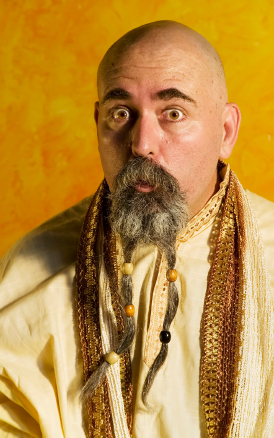 When I first went raw in 1996, and then announced to my family that I was going try to move to California the next year, one of my aunts was worried I might be getting into a cult.
When I first went raw in 1996, and then announced to my family that I was going try to move to California the next year, one of my aunts was worried I might be getting into a cult.
Not that she thought that the raw food diet was a cult, but she had heard of the multiple cults in California, preying on young people.
So she was warning me, and at the time I just laughed at the idea that I could possibly get into a cult.
However, there’s a phrase that I heard then that only made sense later which is:
“There’s nothing like the zeal of the newly converted”
Over the years, I’ve seen people get into the raw food diet and later get involved with the more extreme variations, like fruitarianism, breatharianism, compulsive fasting, never ending “cleanses,” and so on.
I’ve experienced first-hand how raw foodists can be so blinded by their philosophy that they will often:
- Completely ignore obvious and serious warning signs that their health is going downhill
- Refuse to make any changes in their diet because they’ve found “the best”
- Alienate their friends and family with their militant approach
And I say that from experience. I did these exact three things!
So is the raw food diet a cult?
Well, it’s not an organized cult with one charismatic leader who brainwashes his followers into giving him their hard-earned money, abuses them in other ways and threatens them whenever they talk about leaving “the club.”
However, many people naturally will create an environment with the raw food diet that is strangely similar to that of a cult.
I’m not anti raw foods, by the way.
I’m only pointing out the weird ways in which people who think they’ve “liberated their minds” are actually enslaving themselves to another philosophy without compromises.
Let’s take a look at the 14 Characteristics of a Cult by the American Family Foundation and see if the raw food diet can sometime apply to them.
1. The group is focused on a living leader to whom members seem to display excessively zealous, unquestioning commitment.
Well, I’ve certainly seen that one happen. Many followers of famous raw food promoters, especially the more charismatic or influential ones, display these characteristics. Shall we name names?
2. The group is preoccupied with bringing in new members.
Many raw food circles are obsessed with converting more people to the raw food diet. However, this is not done in the same way cults do it. Members of a cult will proactively come to you to ask you to join the cult under a false pretense, like a personality test, or by asking you what you think about a certain event. Most raw foodists come into the “cult” through their own research or through the advice of a friend.
3. The group is preoccupied with making money.
The Raw Food Movement is not ONE group but a combination of many different people with different opinions. Among these people you’ll certainly find people that are obsessed with making money. However, we have to differentiate people making a living offering an honest product and service, and others pushing dangerous supplements using false science, or lying and plagiarizing to achieve their objectives. Overall people who make a living in raw foods are a hard-working, honest bunch, but there are some bad apples that ruin everything.
4. Questioning, doubt, and dissent are discouraged or even punished.
Yes! This is where I think many raw food circles are a cult. Whenever you hear a raw food expert talk, you get the feeling that it’s “his way or the highway.” Everyone else is stupid, but they have the absolute truth. And if you don’t get the results, it’s because you didn’t follow their advice properly. There is no room for compromise or questioning, and anyone who does is kicked out of the group. The sad reality is that many raw food groups operate this way.
5. Mind-numbing techniques (such as meditation, chanting, speaking in tongues, denunciation sessions, debilitating work routines) are used to suppress doubts about the group and its leader(s).
I haven’t seen that happen too much in raw food retreats, but what about you? I could always introduce new chants in my next raw food retreats!
6. The leadership dictates sometimes in great detail how members should think, act, and feel (for example: members must get permission from leaders to date, change jobs, get married; leaders may prescribe what types of clothes to wear, where to live, how to discipline children, and so forth).
Militant raw vegans can act this way. For example, unless one is 100% vegan, they are considered an “animal abuser.” If there’s a piece of leather on their shoes, then that is not allowed in the group. Overall, raw foodists haven’t reached the cult status in this category yet!
7. The group is elitist, claiming a special, exalted status for itself, its leader(s), and members (for example: the leader is considered the Messiah or an avatar; the group and/or the leader has a special mission to save humanity).
This is unfortunately true of almost all raw food groups. Raw foodism is extremely elitist because it claims to have found the answer to all of humanity’s health problems. They’re on a mission to save humanity, and raw foodists will always look down on people who eat a SAD diet, or who are overweight, and not understand why they can’t make a change in their life. Judgements are passed constantly without knowing anything about the people that are being judged.
8. The group has a polarized us-versus-them mentality, which causes conflict with the wider society.
This is absolutely true of the raw food diet. Raw foodists feel they can’t fit in the “outside” world. They can’t eat out with friends and family, because they can’t compromise on their diet. They feel alone yet they refuse to take part in many aspects of society because they are now above the rest of the world.
9. The group’s leader is not accountable to any authorities (as are, for example, military commanders and ministers, priests, monks, and rabbis of mainstream denominations).
We haven’t reached that stage yet…
10. The group teaches or implies that its supposedly exalted ends justify means that members would have considered unethical before joining the group (for example: collecting money for bogus charities).
I haven’t seen that happen yet…
11. The leadership induces guilt feelings in members in order to control them.
I’ve definitely see that happen a lot. WHen I was a raw foodist in California, my friends would make fun of people who used to eat a raw food diet but gave it up. This made me feel extremely guilty when I decided to experiment with cooked foods again, as if I was doing something terribly wrong.
12. Members’ subservience to the group causes them to cut ties with family and friends, and to give up personal goals and activities that were of interest before joining the group.
While raw food leaders certainly don’t ask you to cut ties with your family and friends who are not raw foodists, the “us vs. them” philosophy that’s incorporated into the raw food message often makes people alienate their friends and family, and want to socialize only with people who can agree with them on that level.
13. Members are expected to devote inordinate amounts of time to the group.
So far I haven’t seen raw food potlucks encourage people to come back every day for more!
14. Members are encouraged or required to live and/or socialize only with other group members.
Again, I haven’t seen that happen too much. Although, many raw foodists look down on “cooked food eaters” and tend to look down even more on “ex-raw foodists,” the worst category of betrayers…
So in conclusion, it’s clear that the raw food diet is not a cult. However, many raw foodists create walls around them and act sometimes like their diet is a cult.
For the past three years, I’ve been working on a project that I felt the raw food world was not yet ready to hear.
I’ll tell you more about it in a future post. I feel the time is right to release it.
The title in progress is:
The Raw Food Dilemma
More on it later…
Frederic Patenaude's Blog
- Frederic Patenaude's profile
- 11 followers



